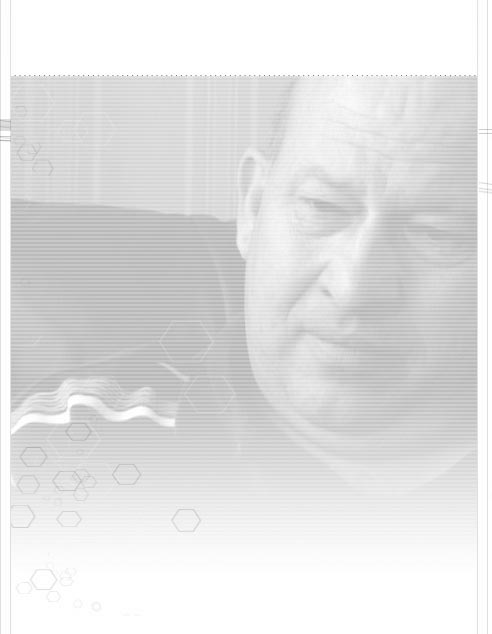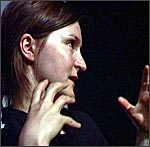
Chris Rawlence - Making it Happen
Bernard Meets Emily
 March 2004. I saw Emily Young's first feature film 'Kiss of Death'. It's a remarkable pass on the spiritual complexity of dying from someone in their early 30s. We meet. I discover that she's made a film about deaf-blindness - as have I. Her father has recently died and although perhaps still in that emotional place of loss she speaks about death and dying easily. We tentatively decide to go ahead.
March 2004. I saw Emily Young's first feature film 'Kiss of Death'. It's a remarkable pass on the spiritual complexity of dying from someone in their early 30s. We meet. I discover that she's made a film about deaf-blindness - as have I. Her father has recently died and although perhaps still in that emotional place of loss she speaks about death and dying easily. We tentatively decide to go ahead.
March 2004. Another Tuesday in the Day Centre. 'I get floating babies, like cherubs', Bob is saying. 'I get those too,' Bernard says. 'Yesterday I saw a young kid melt through my living room wall.' This is interesting. I move closer to the conversation. They are talking about the hallucinations caused by brain tumours.
Bob is frightened by his visions because they make him feel as if he's going mad. Bernard is more sanguine. He knows they are caused by his brain tumour. I offer some crude neurology - the visual areas of his brain are still hungry for sensation but because Bernard is now blind his brain is not receiving this through his eyes. So his brain invents, instead, tapping in to the vast banks of imagery that make up Bernard's visual memory. There's a psychological element here too. It's not necessarily just any old visual memory that's called up. What Bernard hallucinates is partly a function of his state of feeling.
My populist brain theory goes down well with Bob who welcomes an explanation for his visions. It makes sense to Bernard as well who adds, 'I was driving along the A2 last week and saw terraces of old Victorian houses - but there aren't any Victorian houses where we were.'
As we chat it occurs to me that Bernard's feelings about his blindness would make a brilliant subject for Emily's Requiem film.
April 2004. Bernard seems a bit cagey when I propose that we make a film with him. I sense a Trade Unionist's suspicion of the media in his response. But he softens when I suggest that his insights into and feelings about hallucinations might reassure others in a similar situation to him. I often observe this among the people I work with at the hospice - the notion that their experience could actually help others restores a sense of purpose and self-esteem that the ravages of illness have taken away.
May 2004. I take Emily to meet Bernard at his home. Bernard's wife Val is there. We're on for the film, in spite of slight reservations from their grown up sons about being taken advantage of. It's vital to bear this caution in mind as we proceed.
June 2004. The film is made. I love it. Bernard speaks openly about blindness and his uncertain future. The style of the film, with cuts to black, abstract flashes of light, out of focus ripple effects, and so on, succeeds in evoking Bernard's current visual world - although who's ultimately to say? When I call Val and ask her what she thinks of it she says that I must have given her a dud tape - 'It kept going black'. I can only laugh.
